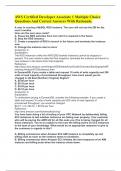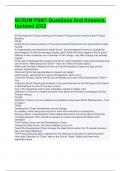Exam (elaborations)
AWS Certified Developer Associate 1 Multiple Choice Questions And Correct Answers With Rationale.
- Course
- Institution
AWS Certified Developer Associate 1 Multiple Choice Questions And Correct Answers With Rationale. A user is running a MySQL RDS instance. The user will not use the DB for the next 3 months. How can the user save costs? A. Pause the RDS activities from CLI until it is required in the future B....
[Show more]




